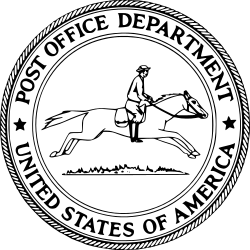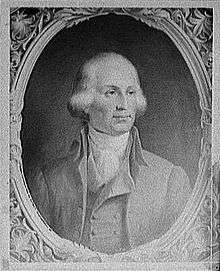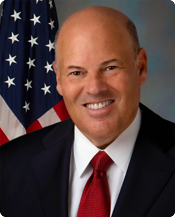United States Postmaster General
The United States postmaster general is the chief executive officer of the United States Postal Service. The current postmaster general is Louis DeJoy, who took office June 15, 2020.
| United States Postmaster General | |
|---|---|
 Seal of the former Post Office Department | |
| United States Postal Service | |
| Style | Postmaster General |
| Status | Chief executive |
| Member of | Board of Governors |
| Seat | 475 L'Enfant Plaza SW, Washington, D.C. |
| Appointer | Board of Governors |
| Term length | No fixed term |
| Constituting instrument | 39 U.S.C. § 203 |
| Formation | 1775 |
| First holder | Benjamin Franklin |
| Deputy | Deputy Postmaster General |
| Salary | $291,650[1] |
| Website | about.usps.com |
Appointed members of the Board of Governors of the United States Postal Service select the postmaster general and deputy postmaster general, who then join the board.
History
The office, in one form or another, is older than both the United States Constitution and the United States Declaration of Independence. Benjamin Franklin was appointed by the Continental Congress as the first postmaster general in 1775[2] serving just over 15 months. Franklin had previously served as deputy postmaster for the British colonies of North America since 1753.
Until 1971, the postmaster general was the head of the Post Office Department (or simply "Post Office" until the 1820s).[3]:60–65 During that era, the postmaster general was appointed by the president of the United States, with the advice and consent of the United States Senate.[3]:120 From 1829 to 1971, the postmaster general was a member of the president's Cabinet. After the passage of the Pendleton Civil Service Reform Act and prior to the passage of the Hatch Act of 1939,[4] the postmaster general was in charge of the governing party's patronage and was a powerful position which held much influence within the party, as exemplified by James Farley's 1933-1940 tenure under Franklin D. Roosevelt.[5]
After the spoils system was reformed, the position remained a Cabinet post, and it was often given to a new president's campaign manager or other key political supporter, including Arthur Summerfield, W. Marvin Watson, and Larry O'Brien (all of whom played key roles organizing the campaigns of presidents Eisenhower, Kennedy, and Johnson, respectively), and was considered something of a sinecure. Notably, poet and literary scholar Charles Olson (who served as a Democratic National Committee official during the 1944 United States presidential election) declined the position in January 1945.
In 1971, the Post Office Department was re-organized into the United States Postal Service, an independent agency of the executive branch. Therefore, the postmaster general is no longer a member of the Cabinet[6] and is no longer in the line of presidential succession. The postmaster general is now appointed by nine "governors", appointed by the president with the advice and consent of the Senate. The governors, along with the postmaster general and the deputy postmaster general, constitute the full Postal Service Board of Governors.[3]:120[7]
The postmaster general is the second-highest paid U.S. government official, based on publicly available salary information, after the president of the United States.[8]
2020
The head of the Iowa Postal Workers Union alleged Tuesday August 11, 2020 that mail sorting machines are 'being removed' from Post Offices in her state due to new policies imposed by Postmaster General Louis DeJoy, a major GOP donor to President Donald Trump whose operational changes have resulted in dramatic mail slowdowns across the nation. Asked by NPR's Noel King whether she has felt the impact of DeJoy's changes, Iowa Postal Workers Union president Kimberly Karol—a 30-year Postal Service veteran—answered in the affirmative, saying 'mail is beginning to pile up in our offices, and we're seeing equipment being removed.' Karol went on to specify that 'equipment that we use to process mail for delivery'—including sorting machines—is being removed from Postal Service facilities in Iowa as DeJoy rushes ahead with policies that, according to critics, are sabotaging the Postal Service's day-to-day operations less than 90 days before an election that could hinge on mail-in ballots." [9][10]
Postmasters general under the Continental Congress
| Name | Date appointed |
|---|---|
| Benjamin Franklin | July 26, 1775 |
| Richard Bache | November 7, 1776 |
| Ebenezer Hazard | January 28, 1782 |

Postmasters general over the U.S. Post Office Department, 1789–1971
As non-Cabinet department, 1789–1829
| Name | State of residence | Date appointed | President(s) served under |
|---|---|---|---|
| Samuel Osgood Federalist | Massachusetts | September 26, 1789 | Washington |
| Timothy Pickering Federalist | Pennsylvania | August 12, 1791 | Washington |
| Joseph Habersham Independent | Georgia | February 25, 1795 | Washington, Adams, Jefferson |
| Gideon Granger Democratic-Republican Party | Connecticut | November 28, 1801 | Jefferson, Madison |
| Return J. Meigs, Jr. Democratic-Republican Party | Ohio | March 17, 1814 | Madison, Monroe |
| John McLean Democratic-Republican Party | Ohio | June 26, 1823 | Monroe, J. Q. Adams |
As cabinet department, 1829–1971
- Parties
No party Federalist Democratic-Republican Democratic Whig Republican
| Political Party | Name | State of residence | Date appointed | President(s) served under |
|---|---|---|---|---|
| 10 | William T. Barry | Kentucky | March 9, 1829 | Jackson |
| 11 | Amos Kendall | Kentucky | May 1, 1835 | Jackson, Van Buren |
| 12 | John M. Niles | Connecticut | May 19, 1840 | Van Buren |
| 13 | Francis Granger | New York | March 6, 1841 | W. H. Harrison, Tyler |
| 14 | Charles A. Wickliffe | Kentucky | September 13, 1841 | Tyler |
| 15 | Cave Johnson | Tennessee | March 6, 1845 | Polk |
| 16 | Jacob Collamer | Vermont | March 8, 1849 | Taylor |
| 17 | Nathan K. Hall | New York | July 23, 1850 | Fillmore |
| 18 | Samuel Dickinson Hubbard | Connecticut | August 31, 1852 | Fillmore |
| 19 | James Campbell | Pennsylvania | March 7, 1853 | Pierce |
| 20 | Aaron V. Brown | Tennessee | March 6, 1857 | Buchanan |
| 21 | Joseph Holt | Kentucky | March 14, 1859 | Buchanan |
| 22 | Horatio King | Maine | February 12, 1861 | Buchanan |
| 23 | Montgomery Blair | District of Columbia | March 5, 1861 | Lincoln |
| 24 | William Dennison | Ohio | September 24, 1864 | Lincoln, A. Johnson |
| 25 | Alexander W. Randall | Wisconsin | July 25, 1866 | A. Johnson |
| 26 | John A. J. Creswell | Maryland | March 5, 1869 | Grant |
| 27 | James W. Marshall | Virginia | July 3, 1874 | Grant |
| 28 | Marshall Jewell | Connecticut | August 24, 1874 | Grant |
| 29 | James N. Tyner | Indiana | July 12, 1876 | Grant |
| 30 | David M. Key | Tennessee | March 12, 1877 | Hayes |
| 31 | Horace Maynard | Tennessee | June 2, 1880 | Hayes |
| 32 | Thomas Lemuel James | New York | March 5, 1881 | Garfield, Arthur |
| 33 | Timothy O. Howe | Wisconsin | December 20, 1881 | Arthur |
| 34 | Walter Q. Gresham | Indiana | April 3, 1883 | Arthur |
| 35 | Frank Hatton | Iowa | October 14, 1884 | Arthur |
| 36 | William F. Vilas | Wisconsin | March 6, 1885 | Cleveland |
| 37 | Donald M. Dickinson | Michigan | January 6, 1888 | Cleveland |
| 38 | John Wanamaker | Pennsylvania | March 5, 1889 | B. Harrison |
| 39 | Wilson S. Bissell | New York | March 6, 1893 | Cleveland |
| 40 | William L. Wilson | West Virginia | March 1, 1895 | Cleveland |
| 41 | James A. Gary | Maryland | March 5, 1897 | McKinley |
| 42 | Charles Emory Smith | Pennsylvania | April 21, 1898 | McKinley, T. Roosevelt |
| 43 | Henry C. Payne | Wisconsin | January 9, 1902 | T. Roosevelt |
| 44 | Robert J. Wynne | Pennsylvania | October 10, 1904 | T. Roosevelt |
| 45 | George B. Cortelyou | New York | March 6, 1905 | T. Roosevelt |
| 46 | George von L. Meyer | Massachusetts | January 15, 1907 | T. Roosevelt |
| 47 | Frank H. Hitchcock | Massachusetts | March 5, 1909 | Taft |
| 48 | Albert S. Burleson | Texas | March 5, 1913 | Wilson |
| 49 | Will H. Hays | Indiana | March 5, 1921 | Harding |
| 50 | Hubert Work | Colorado | March 4, 1922 | Harding |
| 51 | Harry S. New | Indiana | February 27, 1923 | Harding, Coolidge |
| 52 | Walter F. Brown | Ohio | March 5, 1929 | Hoover |
| 53 | James A. Farley | New York | March 4, 1933 | F. Roosevelt |
| 54 | Frank C. Walker | Pennsylvania | September 10, 1940 | F. Roosevelt, Truman |
| 55 | Robert E. Hannegan | Missouri | May 8, 1945 | Truman |
| 56 | Jesse M. Donaldson | Missouri | December 16, 1947 | Truman |
| 57 | Arthur E. Summerfield | Michigan | January 21, 1953 | Eisenhower |
| 58 | J. Edward Day | California | January 21, 1961 | Kennedy |
| 59 | John A. Gronouski | Wisconsin | September 30, 1963 | Kennedy, L. Johnson |
| 60 | Lawrence F. O'Brien | Massachusetts | November 3, 1965 | L. Johnson |
| 61 | W. Marvin Watson | Texas | April 26, 1968 | L. Johnson |
| 62 | Winton M. Blount | Alabama | January 22, 1969 | Nixon |
Postmasters general over the U.S. Postal Service, 1971–present
| Name | Date appointed[11] | President(s) served under |
|---|---|---|
| Winton M. Blount | July 1, 1971 | Nixon |
| E. T. Klassen | January 1, 1972 | Nixon, Ford |
| Benjamin F. Bailar | February 16, 1975 | Ford, Carter |
| William F. Bolger | March 15, 1978 | Carter, Reagan |
| Paul N. Carlin | January 1, 1985 | Reagan |
| Albert Vincent Casey | January 7, 1986 | |
| Preston Robert Tisch | August 16, 1986 | |
| Anthony M. Frank | March 1, 1988 | Reagan, H.W. Bush |
| Marvin Travis Runyon | July 6, 1992 | H.W. Bush, Clinton |
| William J. Henderson | May 16, 1998 | Clinton, Bush |
| John E. Potter | June 1, 2001 | Bush, Obama |
| Patrick R. Donahoe | January 14, 2011 | Obama |
| Megan Brennan | February 1, 2015 | Obama, Trump |
| Louis DeJoy | June 15, 2020 | Trump |
See also
- Postmaster General
- John Henninger Reagan, the only postmaster general of the Confederate States of America
References
- "Form 10-K: Annual Report Pursuant to Section 13 or 15(D) of the Securities Exchange Act of 1934" (PDF). United States Postal Service. 2019. p. 96.
- "Benjamin Franklin — About USPS" (PDF). United States Postal Service. Historian US Postal Service. February 2003. Archived (PDF) from the original on 6 October 2019. Retrieved 6 October 2019.
- The United States Postal Service: An American History 1775–2006 (PDF). United States Postal Service. 2020. ISBN 978-0-9630952-4-4.
- Savage, Sean J. (1991). Roosevelt: The Party Leader, 1932-1945. University Press of Kentucky. ISBN 978-0813117553. Archived from the original on July 9, 2020.
- "Farley And Howe To Rule Patronage; To Ease Roosevelt's Burden, They Will Meet the Office-seekers at Capital. Working All Next Month. Meantime, Republicans Plan to Reorganize Committees and Start Publicity for 1936". The New York Times. January 11, 1933.
- "History of the United States Postal Service". Mailbox Near Me. Retrieved 2019-11-07.
- "About the Board of Governors". United States Postal Service. Archived from the original on 2011-09-27. Retrieved 2018-05-18.
- Sauter, Michael B.; Ogg, Jon C. "The 10 Highest-Paid Government Jobs". 24/7WallSt.com. Archived from the original on March 5, 2016. Retrieved 5 September 2011.
- "A Conspiracy to Steal the Election, Folks': Alarms Sound After Postal Worker Reports Removal of Sorting Machines". Common Dreams. Retrieved August 14, 2020.
- "Donald Trump and His Postmaster General Are Sabotaging Democracy in Plain Sight". The Nation. Retrieved August 14, 2020.
- Since July 1, 1971, the Postmaster General has been appointed by and serves under the Board of Governors of the United States Postal Service.
External links
- "Postal leadership". USPS. June 2020. Archived from the original on 2014-10-03.
- "Papers of Arthur E. Summerfield, Postmaster General, 1953–1961". Dwight D. Eisenhower Presidential Library. Archived from the original on May 12, 2008.
